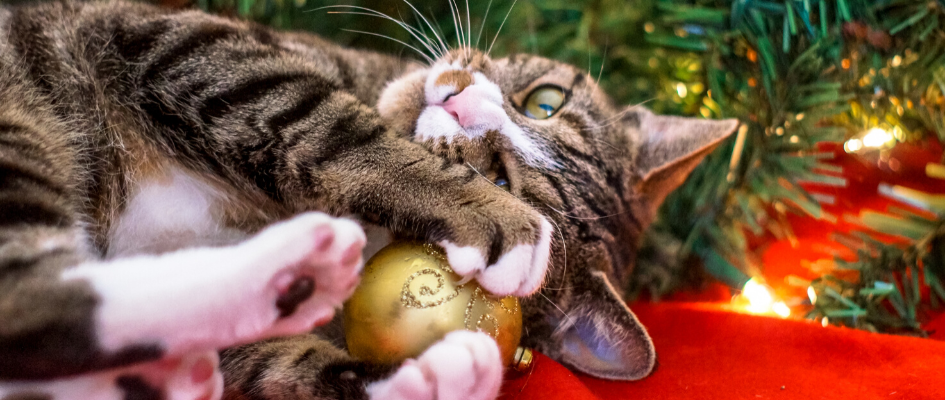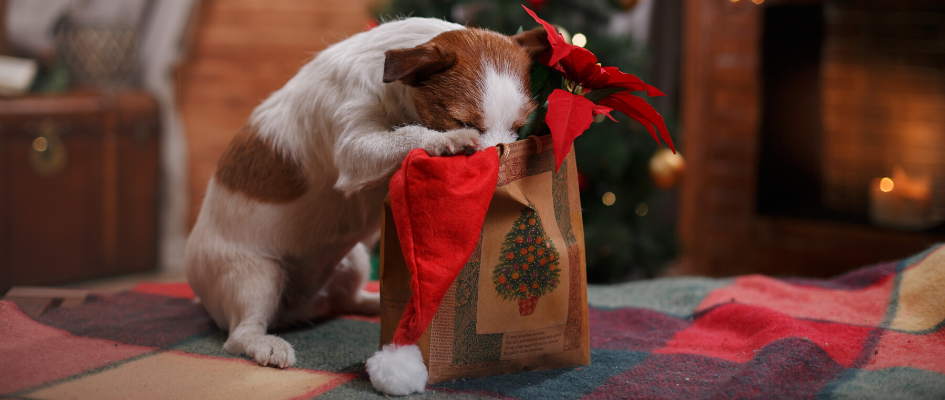For most humans, Christmas is when we meet up with friends, celebrate with rich food and drink, put up sparkling decorations and have a wonderful time! However, for our pets, it can be really tough. Stress from strangers in the house, a change of routine, unexpected hazards from decorations and tasty foods that prove to have nasty toxic side effects. So, what can we do to make the festive season pet-friendly?
MINIMISE STRESS
“God rest ye merry gentlemen let nothing you dismay…” But all those merry gentlemen certainly can dismay our pets! Almost all of them find the presence of strange people in the house stressful. Dogs may respond to this by aggression, destructive behaviours or hiding; rabbits freeze and try and stay motionless; whereas cats are more likely to start urine spraying, hide or just vanish for the duration. However, even an apparently excited and waggy dog may not be as happy as they seem – while some dogs genuinely do love company, others try and cope with the stress by being extra friendly.
Ideally, you should avoid putting your pet into a stressful situation at all. This means allowing them to have their own quiet space, away from people, minimising the amount of interaction with strangers (so those festive cat and dog costumes probably aren’t a good idea) and, as far as possible, keeping to their normal routine.
However, they aren’t going to be able to avoid the holiday season completely, so you will also have to look at managing their stress. For dogs and cats, the best approach is the use of pheromones – Feliway for cats and Adaptil for dogs. Sadly, there aren’t any products designed specifically for rabbits, but if your pet is really suffering, whatever their species, bring them down to see us and our vets can prescribe anti-anxiety medications that are very effective in the short-term.

AVOID ORNAMENT INJURIES
“Deck the halls with boughs of holly…” And fir trees, glass and plastic ornaments, ribbons, tinsel, lights and candles. All lovely to look at, all potentially dangerous! Cats often like to play with bright shiny things, but they can easily get themselves cut (on a broken glass bauble, for example) or burned by candle flames or hot fairy lights. Cats also love to play pounce with tinsel and ribbons, but if swallowed they can form a “linear foreign body”, cutting into the intestinal walls. find out more about what you can do with advice from Cats Protection.
Dogs, on the other hand, are more likely to try eating things – and any ornament can cause an intestinal blockage, or break and cut the mouth or bowel.
Christmas trees are a particular threat, as to cats they are nice climbing frames (potentially resulting in it raining cats as well as needles), while to dogs they are a convenient urinal (which may result in electric shocks in a rather unfortunate location).
The simplest way to avoid injuries is by preventing pets from having any unsupervised contact with ornaments or decorations!

PREVENT POISONING
“So bring us a figgy pudding, so bring us a figgy pudding, so bring us a figgy pudding and bring it out here…” Sadly, so many of our festive favourites can be toxic to our pets. Most people know how dangerous chocolate is for dogs (and the darker the chocolate, the more toxic it is). However, did you know that coffee, peanuts, Macadamia nuts, onions, and even raisins and dried fruit are all poisonous to dogs and cats? So no slices of Christmas pudding, mince pies, festive nuts, sage and onion stuffing for our pets! The Dogs Trust have created a Doggy Christmas Menu – especially designed with dogs in mind!
In addition, cooked bones are highly dangerous as they can splinter in the mouth or gut, leading to sharp wounds and even perforated bowels. So, watch out for left-over turkey carcasses!
Finally, be very careful not to give them too much rich food and treats – dogs and cats do not thrive on rapidly changing diets, and a sudden change can lead to nasty vomiting and diarrhoea. Likewise, rabbits shouldn’t have too many seeds and treats, but make sure they have plenty of good quality hay.
Christmas with pets can be great fun for both of you, but you do have to take certain precautions! If in doubt, contact your local Goddard vet for more advice.
